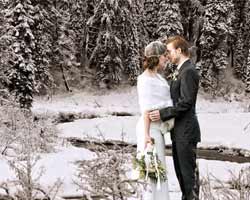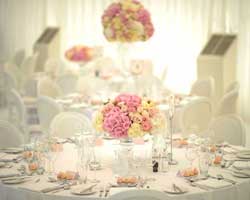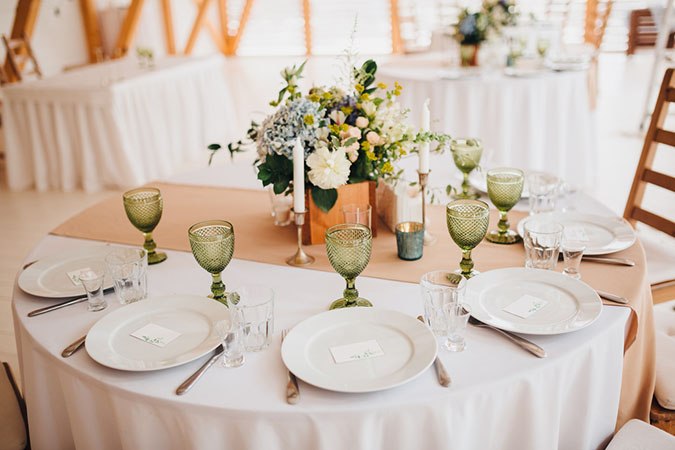 If you’re interested in starting your own wedding or event planning business, investing in wedding planning or event planning training is an excellent first step toward doing so. If this is an educational or career move you’re currently exploring, there are several relevant factors worth considering before you dive in.
If you’re interested in starting your own wedding or event planning business, investing in wedding planning or event planning training is an excellent first step toward doing so. If this is an educational or career move you’re currently exploring, there are several relevant factors worth considering before you dive in.
From hosting your first consultation to learning how to charge clients for different services, there’s plenty of industry standard knowledge in circulation that all aspiring wedding and event planners should research before getting started. To help you begin your research, below we’ve outlined some answers to a few of the most common and important questions we’re asked by aspiring wedding and event planning professionals:
What Do Wedding Planners Do?
Initial Consultation
The initial consultation between a planner and the client is when all expectations are set. During this meeting, the client explains what he or she needs from the wedding or event planner, and the planner responds by explaining what they are capable of fulfilling. Any number of people may attend this initial meeting. If it is a wedding consultation for example, a planner may just meet with the couple. Other times the couple’s parents join in, and some couples even bring friends or siblings. However, one of your jobs as a planner is to establish who the “true” client is. Since many involved parties on the client end may have differing opinions throughout the planning process, during the consultation you need to explicitly determine who the real client is, and therefore who gets the final say in all matters at the end of the day.
Once the true client is established and he or she has shared a general overview of the services needed, the wedding or event planner then typically shares a summary of the packages they have available that seem to fit those needs. Usually, this is the difference between Full Service or Day-Of Coordination packages, and it’s extremely crucial for the planner to thoroughly and explicitly explain the difference between the two. In short, day of coordination involves taking care of all the logistical details of the wedding on the day of the wedding itself, whereas full service planning also involves managing budget, vendors, venues, and any other details.
Most wedding and event planners offer both of these services and leave it up to the clients to decide which they need. Typically, you should have a printed list handy that details what is included in each respective package. However, it’s important to remember that every client is different, and their needs will always vary. The best planners can be flexible and accommodate these special requests as they arise.
Learn more about planning a wedding and event consultation.
What is a Day-Of Wedding and Event Planner?
If you have been hired to provide day-of wedding or event planning services to your client, the first thing you should do is obtain a list of contracts corresponding to each contributing vendor the client has decided to work with. From there, you need to contact each vender (about a week before the event itself) and introduce yourself. During that call, you need to make sure you have all accurate information about what that vendor will be providing on the big day. You should also be sure to have the most convenient contact information so you can get in touch with them ASAP if necessary.
To make sure the day goes smoothly, it’s also important to create a detailed timeline to follow. Make sure to include everything from the photographer’s photo ops to the DJ or band’s arrival time. From start to finish, you need to know what time every piece is scheduled to come together on the big day. To keep everyone on the same page, a copy of this timeline document should be handed out to everyone in the wedding party (you can do this at the rehearsal).
Keep in mind, the phrase “Day of Coordinator” is a bit misleading, as it’s important for these planners to attend the rehearsal as well. The rehearsal is truly your last chance to confirm all the scheduling details with the couple.
Day-Of Responsibilities
On the day of the wedding or event, the planner should arrive at the venue early enough to supervise all vendor set-up, answer any questions and handle any issues that may arise. For weddings, planners need to make sure the couple, the DJ/band and the photographer are all on the same page as far as the event timeline (grand entrance, first dance, cake cutting, garter toss, etc.).
The day-of planner should also be the person who coordinates all interactions between all the vendors and the hosts on the day of the party. Essentially, the hosts should be able to enjoy the event and socialize with their guests without having to worry about issues with catering, music, etc. That’s where the day-of planner should really step in to make decisions on their behalf. As the planner, you should be familiar enough with the client’s vision to be able to make these calls without having to interrupt the hosts for confirmation- you can really serve as the liaison here.
If you’re working day-of coordination for a wedding specifically, once the ceremony is about to begin you should be making sure the guests/ wedding party are all in the right place. You are responsible for cueing ushers, greeters, etc. and making sure everything goes smoothly and begins on time. You will also likely be responsible for cueing the musicians at the appropriate moments.
After the ceremony, you will also be responsible for smooth transition of guests to the reception. If you’re an event planner, the same applies for day-of coordination for things like conferences or bar mitzvahs. The ceremony, keynote speech or church service is often followed by a reception. Whether you have arranged transportation or the event is near enough to walk, you need to make sure guests move from one to the other promptly and without confusion.
What is a Full-Service Wedding and Event Planner?
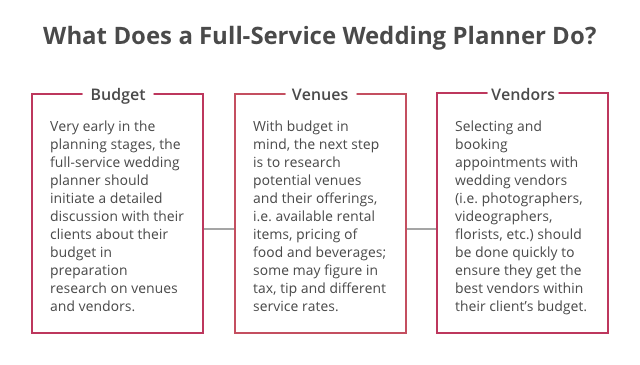
In some cases, your clients would much rather relinquish control of the event planning process to your expertise entirely. If that is the case, you will truly be working with them every step of the way, making every single event or wedding planning decision by their side, per your professional guidance. While this service is obviously worth much more money, it will also take up a great deal of your time- so be prepared for a long-term project made up of many important details.
As mentioned, Full Service wedding planning includes everything we just discussion in Day of Coordination, in addition to the following extras:
Budget
The client’s budget is truly going to affect every aspect of the event. Right off the bat in the planning stages, the planner should initiate a very candid discussion with the client as to their budget for the big day.
Some clients want to handle the budget themselves, and will then let you know how much of it can be spent on certain categories, but some clients will want or need your assistance. Before you consider any venues or start making appointments with your go-to vendors, you must be certain that everyone agrees on the total budget for the wedding. Otherwise, as a planner, you risk wasting a lot of time setting up appointments and doing research on things your clients were never able to afford.
It’s important for planners to understand that budgets, as important as they are, very often change in this industry as the planning process moves along. You need to be prepared for this possibility. Some clients realize halfway through the process that they’re overspending way too much and need to cut back. A skilled wedding or event planner can keep up with these changing expectations and can craft accommodating proposals accordingly, on the go.
Venues
Once the budget has been set, it is time to begin researching venues. Comparing venues can be one of the most complicated aspect of a planner’s job, but it is also where they can be provide the most value to their client. While you browse venues, know that each one will probably include different rental items, price their food and beverage differently and may figure tax, tip and service charges at different rates- these are all things you need to pay attention to.
How do wedding and event planners communicate with venue owners?
It’s crucial for planners to read all venue contracts meticulously. The venue booking will likely be the largest expenditure, and small extras in fine print can really add up to thousands of dollars.
Vendors
Once your venue and date is selected and the hosts have confirmed with their deposit, your next task will be selecting your vendors. In doing so, it’s important to realize that many of the best wedding or event vendors (photographers, caterers, florists, bakers etc.) may book a year or more in advance. To ensure you can always offer the best selection of vendors for your client, you want to begin booking appointments with these vendors (within your client’s budget and style) as soon as they set the event date.
After the venue and vendors are booked and squared away, your clients will need your help with all the other details- think menus, outfits, décor, and everything in between.
Some clients, especially for weddings, call on the wedding planner for help selecting attire. This could mean you will be responsible for booking appointments at bridal salons, or it could simply mean browsing photos with your clients to help them make choices that coordinate with the overall look and feel of the event.
Do wedding planners help the bride pick a wedding dress.
Beyond that, full service planners will also likely be involved with floral design. You should book an appointment with at least one florist in order to plan for any décor, corsages or bouquets you might need for your client’s event.
Read more about booking catering services for a wedding or event.
Your client may also want your assistance with choosing the menu items, the cake (if they’ll have one), the linen colors that will be displayed on tables, any appetizers or food selections, the bar items, and much more
Learn how to plan a wedding or event menu.
Finally, full services planners may be involved in coordinating all printed materials. These are things such as Save the Dates, invitations, rehearsal dinner invitations, menus, place cards, programs and welcome letters. Even if your client does not require your help with all of these details you should still check in to ensure they stay on track with getting everything done properly.
Read more on how wedding and event planners book vendors for their clients.
Would You Make a Good Wedding or Event Planner?
There are many qualities characteristic of most proficient, successful planners in the industry. If this is a field you are strongly considering, you should do some self-reflection to analyze your strengths and weaknesses. That way, throughout your wedding and event planning education you’ll know which areas you need to focus on the most.
Generally, wedding and event planners have some of the following valuable qualities in common:
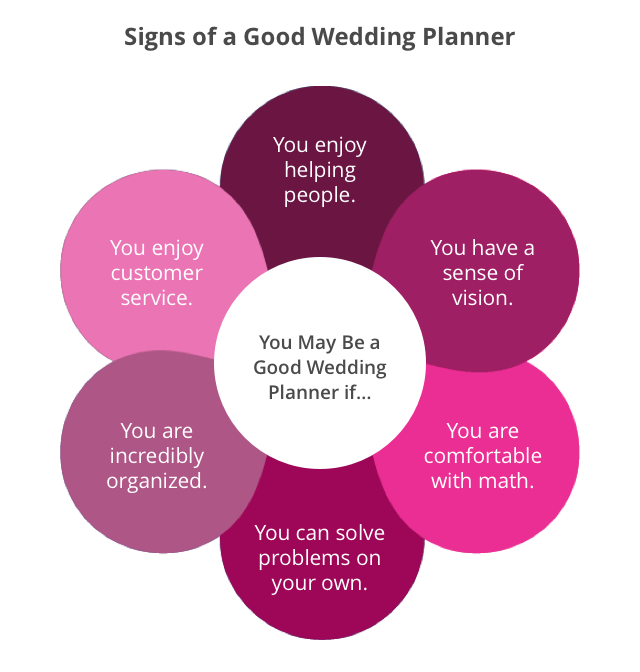
-
You like to help people.
The wedding and event planning industry boils down to constant problem solving, often on the go. From working within a budget to making décor choices, your job is to help find solutions and make things work. And on the big day, if anything fails to come together, it’s your job to come up with a solution on the fly and make it happen.
Weddings and large events can be extremely stressful for hosts who want everything to go perfectly- clients are going to be picky, and if you’re going to make it in this industry, you should be the kind of person who genuinely feels for them and wants the day to be perfect. You should share in their excitement and want everything to go well on their behalf.
-
You can solve problems on your own.
If you’re the kind of person who often feels the need to get the okay from another party before making a big decision, you’ll need to work on your independence in order to make it in this industry. Wedding and event planners are shot-callers in a lot of ways. On the day of the event when something goes wrong, you don’t have time to check with others (and you don’t want to stress the hosts by involving them), so you need to make calls and big decisions on your own, confidently.
-
You have a sense of vision.
This may be a given, but wedding and event planners need to have some type of eye for design. If you don’t have a vision of the perfect execution on the big day, you’ll be less likely to pick up on flaws and small details that need fixing.
If you don't have a sense of vision like this, you will struggle to preempt issues and design a seamless space. You might accidently agree to a too-large centerpiece that blocks guests' view. Or maybe you will choose unflattering lighting for an evening event because you toured the venue during the day, and you weren’t using that visionary eye to picture the event as it would play out/ appear on the big day. Mistakes will be much more common without a sense of vision. Fortunately, proper training can help with many of these issues.
Read more about choosing wedding and event colors.
For an event designer, a sense of vision is even more important. Lots of your clients most likely will not have a vision (unlike working with couples for weddings, who usually have an idea of what they want their special day to look like).
-
You’re comfortable with math.
Even though wedding and event planning are creative industries, there’s more to it than picking color palettes and fancy cakes. There are business and mathematical technicalities you’ll absolutely need to master in order to succeed. From creating to-scale diagrams for event designs to calculating the number of rentals needed based on the final guest count, you will definitely need to brush up on your math skills.
Read 5 professional tips for wedding and event planners.
-
You are incredibly organized.
To be an event planner, you must be incredibly organized. From getting a timeline right down to every minute on the big day to making sure every vendor, caterer, musician and photographer is caught up on where they need to be, you are responsible for making all the pieces come together. If you are not a generally organized person, this will quickly become an overwhelming undertaking.
Learn what to pack in a wedding emergency kit.
-
You enjoy customer service.
Customer service is something you can study, but you need to ask yourself whether for you, it’s something genuine. If you find yourself easily annoyed by people who complain, this may not be the field for you. From vendors that you work with to clients who hire you — it is a service industry, and making the customer happy/ keeping professional relationships healthy with your vendors will always be a huge part of the job.
Learn how wedding and event planners work with difficult clients.
How Much Do Wedding and Event Planners Get Paid?
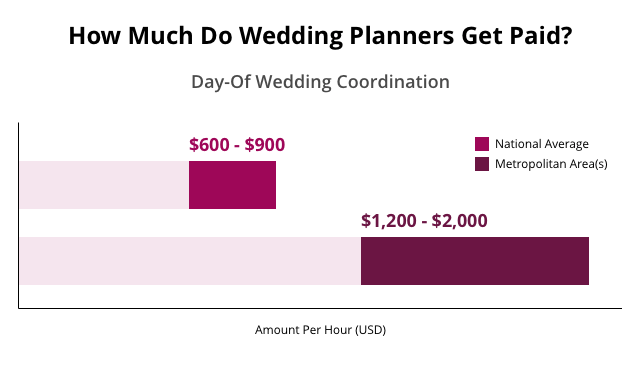
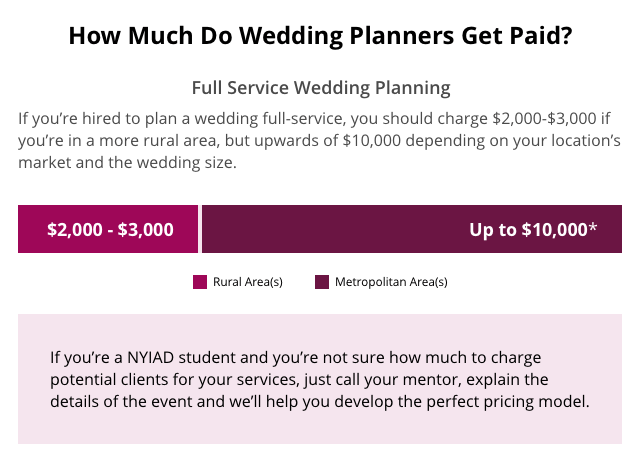
Before diving into the exciting field of wedding and event planning, it’s important for you to have an idea of how much you can expect to be paid for your work. Below are some general outlines of industry-standard pricing models
-
Consultation Price:
If you’re working as a consultant for a client, you will typically bill by the hour.
Wedding and event planners typically charge anywhere from $40-$70 per hour for consulting services. This number also depends on where you are located. If you work in a more metropolitan area like New York City, market rate will be more like $100-$200 per hour.
-
Day-Of Coordination Price:
If a client decides to hire you for Day of Coordination, as we described above, you will help with things like creating a schedule, coordinating with vendors, and setting up properly. Most planners charge anywhere from $600-$900 for this service. However, if you’re working in a metropolitan area, this price would likely be more like $1,200 - $2,000.
-
Full Service Planning Cost:
If the client wants to hire you for a full service planning, this is where you’ll make the most money. If you’re hired full-service, you should charge $2,000-$3,000 if you’re in a more rural area, but upwards of $10,000 depending on your location’s market and the event wedding size.
If you’re a NYIAD student and you’re not sure how much to charge potential clients for your services, just call your mentor, explain the details of the event and we’ll help you develop a pricing model.
Research more on how much wedding and event planners get paid.
How to Gain Wedding or Event Planning Experience
If you’re interesting in gaining experience planning events, we recommend you look for a non-profit that you’d like to support, then reach out and offer to contribute services for free. Often, these organizations hold charitable events to raise money for their efforts. Contributing via free event coordination can provide great experience for your resume and open networking doors, all while supporting a great cause.
How to gain wedding and event planning experience.
How to Host Your First Wedding or Event Consultation

If you’re a wedding or event planner just starting out in the industry, the first interaction you will have with clients is going to be your consultation. To get started, here are 4 things we recommend you have prepared for this meeting:
How to plan a wedding or event consultation.
-
Questionnaire
You should always have a printed list of questions that can help guide you through the meeting. This will help you get the conversation going while you gather some general information about key things. Ask about the size, budget and style of the event to start.
-
Client List
Professional wedding and event planners typically offer new clients a small portfolio containing some testimonials written by couples they’ve worked with in the past. If you’re new to the industry and therefore don’t have past clients to add here, your NYIAD mentor is a great reference to list instead.
-
Portfolio
If you have any experience with planning events (even smaller ones for your own family and friends) you should put together a portfolio of them. Include photos, one of the invitations, a copy of the menu, even your color palette. This just helps your new clients get a sense of your organizational skills as well as your ability to execute events with ease.
-
Vendors List
Most professional planners keep a list of vendors handy during this meeting as well. These are vendors, caterers, photographer that you may have worked with in the past, had positive experiences with, and feel comfortable recommending to couples. Having a list like this will legitimize your industry knowledge and show couples that you have a firm place in the industry and know what you’re doing.
Do I Need a Wedding or Event Planning Degree?
You do not have to go to college to become a wedding or event planner. Several professional associations offer wedding and event planning certifications, however. Obtaining some formal certificate and education is a great way to demonstrate to your clients that you are qualified to do this job.
Another option, albeit a much pricier one, is to earn either a bachelor's or associate degree in event planning. Beyond these options, according to experts at The Balance, it’s recommended that aspiring wedding or event planners study the following topics:
- Food Preparation for Catered Events
- Event Promotion
- Weddings and Ceremonies
- History and Culture of Wine
- Negotiations and Agreements
- Concert and Event Production
- Basic accounting, finance and hospitality
Where Can I Take These Wedding and Event Planning Classes.
Where Can I Learn Wedding or Event Planning?
NYIAD’s online wedding planning course will train you to become a professional wedding planner. It is certified by the Association of Bridal Consultants (ABC), the world’s largest professional wedding planning organization.
Similarly, the online event planning class is designed to help you master the art of event planning. In this program, you will learn how to ensure the success of a multitude of specials events, including meetings, parties, fundraisers, retreats, conferences and many more.
During both courses, you will complete a series of projects allowing you to grow by putting your skills to the test. You will work with a professional wedding or event planner, your teacher and mentor who is there to review your work and help you improve. And at the end, you will earn a wedding or event planning certificate that you can use to obtain a job in this exciting field.
Take an online wedding and planning course.

